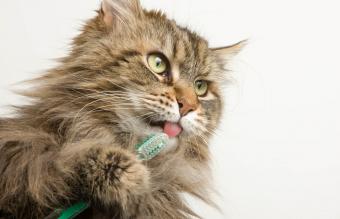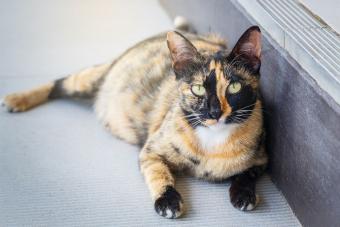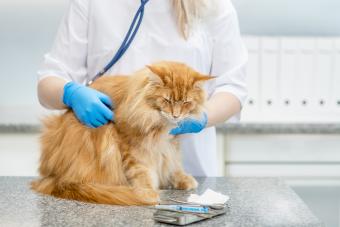
It's not unusual for a cat to lose some teeth during his lifetime although the reasons vary. Tooth loss in cats can range from benign baby teeth loss to signs of serious illness that need to be addressed right away.
Kitten Teeth
All newborn kittens do not have teeth and their first teeth will start to appear in their second or third week of life. A kitten will start shedding his baby teeth when he is about 11 or 12 weeks old as the adult teeth start to form. You should expect your kitten's baby teeth to be fully replaced by all of his adult teeth within the six to nine-month age range.
Physical Injury
Sometimes a tooth can become broken or knocked out due to a physical injury incurred from a cat fight. A physical injury to a tooth could also occur from a freak accident during a play session such as falling from a high cat tree or running into a wall. Cats also can break teeth from chewing on items. Sometimes these injuries do not result in a loss of the tooth but a severe disruption, known as luxation, which a veterinarian may be able to repair surgically or remove depending on the circumstances.
Periodontal Disease
Poor dental hygiene can lead to periodontal disease which can include not only tooth loss but also bad breath, irritated gums and infected teeth and gums. While many cat owners dread the thought of brushing their cat's teeth, keeping them clean is the best way to prevent tooth and gum disease.

Feline Tooth Resorption
Feline odontoclastic resorptive lesion (FORL) is a condition that can lead to tooth loss. It also can be agonizing for your cat and needs veterinary treatment right away. In FORL, lesions form on the gums that appear like cavities or "holes" in a cat's tooth along the gum line. Tooth loss can result if the condition is not treated and treatment generally involves surgically removing the teeth. Once a cat has had FORL it's likely they will develop the condition with other teeth and it's important to check your cat's mouth regularly and practice good dental hygiene.
Old Age
Senior cats will lose their teeth as a result of the aging process where their gums lose their ability to keep teeth securely in place. This is commonly seen with cats after the age of 10. However, tooth loss in older cats may also be linked to serious health issues like diabetes. If you have a senior cat that has lost one or more teeth, it's important to have your veterinarian check him out to make sure there is no underlying diseases related to the tooth loss that need treatment.
Unhealthy Diet
A cat's teeth require specific nutrients in food to remain healthy, just like every other part of a cat's physical system. If your cat is not eating a balanced diet, it's possible for their teeth and gums to decay. Likewise, a diet that is mostly or all wet soft food may contribute to dental disease because it promotes tartar growth and gingivitis. One research study found that cats who ate diets with enough magnesium, calcium, phosphorus and potassium were less likely to develop FORL than cats who ate diets lacking those nutrients.
Signs Your Cat Needs a Veterinarian
There are several reasons why you should bring your cat in to a veterinarian if they have a lost a tooth. This is true even if the tooth loss doesn't appear related to a disease. Never pull a cat's tooth on your own if you think it needs to come out as this is a procedure that needs to be safely performed by a veterinarian.
Problems With Kitten Teeth
If your kitten is losing his baby teeth in the normal time frame, it's not likely that you need to rush him to a veterinarian. However if you notice he still has a baby tooth around six to nine months of age, you should bring him in as that tooth might need to be extracted to make way for the adult teeth.

Adult Cats and Tooth Loss
For adult and senior cats, it's always a good idea to bring your cat in for a checkup if he has lost a tooth. Even if the tooth was lost from an injury, your cat may be in pain and your veterinarian can prescribe medication to ease his discomfort and may also give you antibiotics to ward off infection if the loss was due to a fight.
Serious Symptoms and Tooth Loss
Tooth loss in adult cats can often be linked to medical problems that need treatment from a veterinary professional to keep them from escalating. It's time to schedule a checkup if you notice tooth loss in conjunction with the following symptoms:
- Bad breath also known as halitosis
- Drooling and excessive saliva
- Loss of appetite and associated weight loss
- Red, inflamed gums or bleeding on the gums
- Receding gum lines exposing more of the teeth's surface
- Red "holes" on the surface of the teeth
- Excessive plaque and tartar on the teeth
- Visible cracks in the teeth
- Presence of pus in the mouth along the gums or teeth
- A tooth that appears to be moved into the wrong position (luxation or avulsion)
- Excessive pawing at the mouth
- Changes in behavior including hiding, avoidance and even aggression
Caring for a Cat's Teeth
Brushing your cat's teeth and regularly checking his mouth for signs of inflammation, disease or tooth loss is part of being a responsible cat owner. If you're not sure how to brush your cat's teeth, talk to your veterinarian about learning how to provide regular dental care or consider having the veterinary staff due it for you. Losing teeth can lead to negative behavior changes and weight loss for a cat and they're counting on you to help tackle their discomfort and become a happy cat again.







